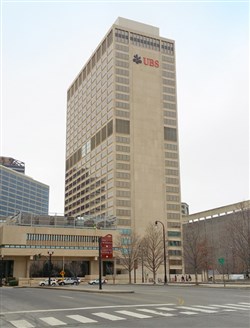VOL. 39 | NO. 10 | Friday, March 6, 2015
Eakin: Rising rents hitting all of Middle Tennessee
By Vincent Troia

Smith
Selling business people on the idea of relocating to Nashville is easy for commercial real estate broker Barry R. Smith because he, too, bought into the city’s charm when he first came to town in 1981.
Much has changed, of course.
With the city, and commercial property leasing, seeing tremendous growth, Smith, now 59, has been riding the crest (or perhaps the swell) of that wave of development since then.
The Kentucky native first cut his teeth at Grubb & Ellis, quickly becoming one of the top brokers in the country, but has been with Eakin Partners since its incarnation. Eakin Partners’ Chairman John W. Eakin rose to the top of Nashville’s office development, leasing and management industry after he and Tom Smith founded Eakin & Smith in 1987.
Now serving as Eakin Partners’ president, Smith has owned the office leasing market for much of the last decade, earning the NAIOP Broker of the Year honor in 2006 and taking the Office Lease of the Year award in 2005. In a career that’s nearing the 35-year mark, Smith has negotiated approximately 4 million square feet of office leases.
Nashville ended 2014 with more than 100 announced expansions or relocations of businesses here, according to numbers from Colliers International, and saw the biggest percentage drop in the overall office vacancy rate (6.7 percent) in seven years.
While more than 8 million square feet of office space was leased or sold, rental rates jumped past $23 per square foot for Class A space, and the combined rate (for Class A, B and C properties) was more than $19 per square foot, according to Colliers.
Working out of an office in Roundabout Plaza on Division Street, Smith has watched Nashville’s rebirth as an “It City” with a mix of certitude and amazement.
The banner year numbers from 2014 have spurred some concerns about limited inventory for Nashville and the potential threat of losing companies to properties in surrounding counties. Smith recently shared his takes on the commercial real estate landscape and his thoughts on Nashville’s future with The Ledger.
Q: Nashville’s 2014 overall office vacancy rate was the lowest in seven years. Is that cause for celebration or a call to find more space?
A: “Both. The demand for office space remains very high with local companies expanding, new companies entering the market, and new arrivals like UBS announcing additional jobs and taking down additional office space. All the Nashville submarkets have seen vacancy rates decrease – some more than others.
“The low vacancy means increasing rental rates, which in turn enhances property values. That’s good for owners, but tenants have to shoulder the burden of those higher rental rates.
“As available space becomes more scarce, there is pent-up demand for new development.

Downtown high-rises, including the UBS Tower (formerly Regions) at 315 Deaderick, offer large blocks of space for easy relocations.
-- Leigh Singleton | The Ledger“However, given the rising cost of construction, the rental rates that are needed to justify new construction must be in the low to mid-30s in terms of dollars per square foot.”
Q: If a smaller inventory of properties means higher rental rates and sale prices, does it prompt potential businesses to look outside of Davidson County?
A: “Yes. You are seeing increasing rental rates in Davidson County. However surrounding counties are not immune to this phenomenon, and they too have very low vacancy rates and ever-increasing rental rates.
“Also, most of the outlying counties don’t have existing inventory to meet the increasing demands of office users. While Williamson County has a significant amount of office space, their vacancy rates are only 2 to 3 percent.
“In order to add new office space in the outlying counties, for the most part, it necessitates new construction.
“While the land costs are less in some of the other counties, the construction costs are basically the same. So, while relocating outside Davidson or Williamson counties can lead to a reduction in overall occupancy costs, due to the necessity of new construction, the rental rates need to reflect those costs.”
Q: You’ve said you were initially drawn to the vibrancy of this city. Was Nashville’s vibe part of your ability to be successful, and has the city’s growth and urban transformation made you fearful of losing that vibe?
A: “Absolutely it was, but am I fearful of losing the vibe? No. Look at the numbers of young people that keep moving here. They still get that vibe. I had it years ago, even before Nashville grew into the world-class place it’s become.
“Nashville’s growth was not a fluke. It was built on reputation. On branding, too. The Nashville Chamber did a great job promoting us as Music City. It might have seemed subtle but that brand really stuck. We had a clear vision for pitching commercial properties, and competition was friendly – which complemented the vibe visitors felt.
“Companies sent managers to visit, and they fell in love with the area. And we chipped away at this success for 25 years or so. It was a lot of baby steps.’’
“Now, at some point does Nashville potentially lose that vibe? Maybe, but I don’t see why it should. The city has a great reputation now from the old and the young.
“The city gets named in the ‘top five’ in every category of every list that ranks cities.”
Q: If area job growth continues and businesses push to expand or relocate, how do you see Davidson County responding to those issues over the next 5-10 years? Is there space in which to grow?
“I think Nashville will be fine. There remains plenty of space – downtown, near Opryland, and near the airport – where there are large office users.
“We have seen lots of opportunity in East Nashville, as well, where people are surprised to see so much space so close to downtown. And look at what HCA is doing (with 11 acres and 500,000 square feet) just north of Charlotte (Avenue, near I-40).
“We now have contrasting types of properties, and I think some people see only big, open pieces of land as inviting to large companies.
“And it used to be that way, especially in Williamson, Rutherford and even Wilson counties, where large companies were building on farmland. I mean the Maryland Farms business development was an actual farm, right?
“But if you starting thinking vertically, all these downtown Nashville high-rises offer the office space for major companies to relocate. Louisiana-Pacific (LP Products) is in Bank America Plaza, Service Source is in the old SunTrust building, UBS in the Regions tower… plus we have been able to build-to-suit for Lifepoint and Bridgestone too.
“It might not work for everybody. There’s a lot of value in Dell or Nissan having large campuses, but some like the feeling of being centrally located in the heart of Nashville.”
Q: How do you balance availability between Class A, B and C properties, and is there a greater need in 2015 for one specific class?
A: “There really isn’t an easy way to balance the availability between classes of office space. The greatest differential between classes of office space is mostly determined by the age of the property.
“Class A means the new, nicer and amenity-driven product with Class B offering some of the same amenities, but in older buildings, and typically Class C properties are significantly older and offer very few amenities.
“The driver in relocating from one property type to another is more a function of a particular company wanting to improve their image and move to a higher class property. Or, it could be that the company is simply priced out of the higher-class property and must opt for a lower class building to meet their financial needs.
“Also, if there was a need for more Class C space, given the fact that the biggest factor in determining Class C properties is their age, that would be a problem since you can’t go out and build a brand new ‘old’ building.”
Q: Did this economic boom for Nashville make it easier on businesses like yours, or has it been harder for you to keep up with the growth?
A: “What made it easier was having potential clients discover that they wanted to be here.
“Honestly. Back around 20 or 25 years ago, we would see clients come to town simply to give Nashville a cursory look.
“Then they would choose to build or lease in Atlanta or Dallas or somewhere like that, thinking that we were too much a small town.
“With the arrival of pro sports, the expansion of the music industry becoming more than just country, and the move to clean up downtown – especially the area south of Broadway – along with the great Chamber rebranding campaign, we didn’t have to sell clients on the area anymore. The area was selling itself.
“I think that’s why Nissan moved its corporate offices here from California.
“When middle managers and some executives visited the manufacturing plant in Smyrna, and spoke to the employees who were buying property and settling down to raise families here, they didn’t want to leave.
“Some requested transfers. Employees that were sent here, even temporarily, didn’t want to go back to California.”
“And that was Smyrna. When other company managers discovered Brentwood or Franklin or Green Hills and were drawn to the Titans or the symphony center or the world-class restaurants, they were hooked.
“Coupled with a low cost of living, and the realization that they could get 4,000-square foot homes for a third of the size of their mortgage payments in California, they were here to stay.
“That certainly got the attention of businesses looking to expand or relocate, which in turn brought them to our attention.
“There was, and is, a lot of hard work – this isn’t a 40-hour-a-week job.
“Look, I love what I do, and I’ve said many times that I couldn’t see myself doing anything else, but I suppose finding clients who are drawn to Nashville like I was does make the work a little easier.”